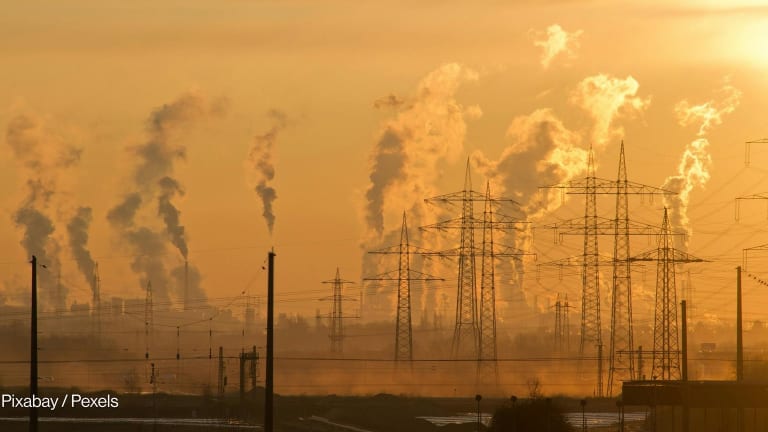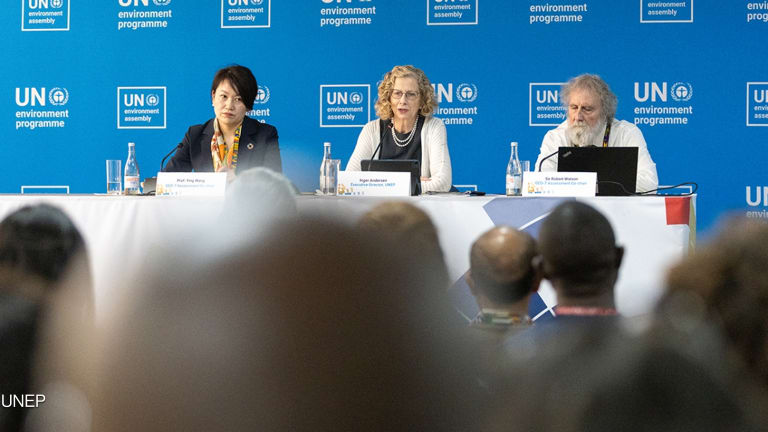Opinion: The right to a healthy environment for everyone, everywhere

In the midst of compound environmental, socioeconomic, and security crises, the United Nations General Assembly has the chance this month to make history — by recognizing the right to a clean, healthy, and sustainable environment.
This would not only fill a longstanding gap in the international human rights framework but, around the world, trigger greater pursuit of environmental action that delivers real benefits for people and the planet, and lays the foundations for lasting peace and prosperity.
Momentum for universal recognition of the right by UNGA has been building for some time, and in June, the Core Group of States on Human Rights and the Environment, which comprises Costa Rica, Maldives, Morocco, Slovenia, and Switzerland, submitted a draft resolution on the right to all United Nations missions. While U.N. resolutions may not be legally binding, they signal clear political commitment and can deliver real-world improvements. They can also provide a rallying call for positive action, including by children and young people who will continue to bear the brunt of the climate crisis.
When in October 2021 the U.N. Human Rights Council adopted a similar resolution from the same five states, the U.N. High Commissioner for Human Rights Michelle Bachelet said the decision recognized “environmental degradation and climate change as interconnected human rights crises,” while the executive director at the U.N. Environment Programme Inger Andersen described it as a “breakthrough … for environmental justice.”
There is strong evidence to support these claims. Recognition in 2010 by UNGA of the related right to water and sanitation, for example, led to its inclusion in national constitutions. Mexico and Slovenia, for instance, made safe drinking water available to rural and marginal communities. And Costa Rica strengthened laws and policies tackling water pollution. With 1 in 3 people globally lacking access to safe drinking water, such outcomes are life-changing.
Universal recognition of the right to a healthy environment by UNGA — which includes the rights to clean air, a safe climate, healthy and sustainable food, safe water and adequate sanitation, nontoxic environments, and healthy ecosystems — has even greater potential.
Air pollution, which is primarily the result of burning fossil fuels, causes 13 deaths per minute worldwide, for example. Recognizing the World Health Organization’s Global Air Quality Guidelines and enshrining the right to clean air in national legislation would help tackle this tragedy and also deliver on the Paris Agreement.
Air, water pollution cost MENA economies 2% in GDP losses: World Bank
World Bank warns of steep economic losses from air and sea pollution in the Middle East and North Africa. A shift to the green economy could help spur the private investment needed to create jobs.
With more than 90% of all children breathing toxic air every day and more than 1 in 4 deaths of children under the age of 5 attributable to unhealthy environments, it would significantly boost implementation of the U.N. Convention on the Rights of the Child and the Human Rights Council resolution on realizing children’s rights through a healthy environment.
The right to a healthy environment
Where the right to a healthy environment has already been recognized as a constitutional or statutory right at a national level, it has sparked stronger environmental laws and policies, greater public participation, and improved environmental performance that have delivered tangible benefits for people and the planet.
Universal recognition now would signal the need to put human rights at the center of a healthy planet and prosperity for all.
—In Brazil, for example, the constitutional right to a healthy environment gives public and civil society organizations access to the independent Ministério Público to report and ask for action on environmental violations. When first enacted, enforcement of environmental laws increased dramatically with over 4,000 civil actions on issues such as deforestation and air pollution filed between 1984 and 2004 in the state of São Paolo alone.
Costa Rica became a global environmental champion after adding the right to a healthy environment to its constitution in 1994 and is a driving force behind the High Ambition Coalition for a global deal for nature and people. Today, 99% of its electricity comes from renewables, open pit mining, and oil and gas development are banned, and carbon taxes are used to pay Indigenous people and farmers to restore forests. And forest cover has increased from a low of around 25% in 1994 to more than 50%.
In 2006, residents of La Oroya in Peru asserted their rights to health and a healthy environment against a gold smelter and secured medical treatment for long-term exposure to lead and other heavy metals.
And in 2009, the Thai Supreme Court halted over 65 petrochemical projects in Map Ta Phut, the country's largest industrial estate, over concerns about environmental harm and cancer deaths resulting from pollution.
Universal recognition of the right to a healthy environment by UNGA now would build on these positive outcomes by emboldening governments, courts, and citizens worldwide to take more effective legal and practical action.
As the U.N. Sustainable Development Goals clearly prescribe, we can only achieve a fair, green, and prosperous future if we find integrated solutions to the humanitarian and environmental challenges we face, and leave no one behind. By recognizing the links between interconnected crises, we stand a better chance of being able to remedy them.
Universal recognition of the right to a clean, healthy, and sustainable environment now would signal the need to put human rights at the center of a healthy planet and prosperity for all, and further empower local communities and individual rightsholders around the world, including Indigenous peoples, environmental and human rights defenders, children and young people, and marginalized people who have contributed least to the crises we face but are paying the highest price.
Everyone everywhere deserves the right to enjoy a healthy environment, and as the principal U.N. policymaking body, UNGA, supported by civil society, business, and U.N. agencies, has a clear mandate to grant it to them. While this resolution is no panacea, with sustained advocacy from all stakeholders, it can help us create a future in which people live in harmony with nature, and secure lasting peace and prosperity. The time is now.

Search for articles
Most Read
- 1
- 2
- 3
- 4
- 5







